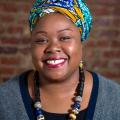As I looked through my Facebook newsfeed I saw many of my African-American friends asking, “How long, oh Lord?” This question is not just one we asked after Alton Sterling and Philando Castile were added to our great cloud of witnesses as the latest victims of racial violence, but this is a question our parents, grandparents, and generations have asked as they faced oppression.
Police killed at least 136 black people in 2016, according to The Guardian’s project The Counted, which tracks police killings in America.
We are just in the seventh month of 2016.
As I looked at the video of Alton Sterling taking his last breath I thought about the countless black bodies murdered due to racial violence, and I tweeted this:
“My biggest prayer with my entire heart, soul & mind is that my people will be free from this captivity & that my descendants will be free.”
Reading Luke 11:1-13, I am reminded of one of the most famous prayers in history: the Lord's Prayer. Prayer was extremely important in the Hebrew culture Jesus grew up in, which is why out of all the things his disciples could have asked him to teach them they asked him to teach them how to pray.
The Hebrew word Tefilah (תפילה) is generally translated into English as the word "prayer." But this is not an accurate translation, for to pray means to beg, beseech, implore, and the like.
Tefilah calls us to deeply honest prayer, not the calm, cool, and collected prayer of a comfortable person, but it calls us to the cry of the desperate. My people and I are desperate for liberation.
After Jesus teaches his disciples what to pray he teaches them how to pray with faith and trust that their Heavenly Father will provide them what they ask. This is probably the hardest lesson about prayer because after you honestly pour out your heart to God, you then have to trust that you will be given what you are praying for. Some things are easy to trust God for, but other things like systematic justice for Black Lives and world peace are hard to trust God for. So what do we do? Stop praying? What do we pray? How long oh Lord, how long do we wait?
I am a firm believer in the words of Jesus' little brother James the Just: "faith without action is dead." (James 2:17)
As I desperately cry out to God for my people to receive justice in prayer, I also pray with my feet as I march and pray with my hands as I organize with the Live Free Campaign which is led by black faith communities across the nation to end mass incarceration, gun violence, and police brutality. As people of faith we must believe that God will answer our prayers for justice. We have to believe this deep down in our souls or our prayers and actions are in vain. I know that believing is easier said than done, but my enslaved ancestors prayed for freedom, and though many of them did not receive it in their lifetimes I am free from slavery.
The key to praying during times of desperation where the videos of dead black bodies don't stop playing on our news feeds, in our minds, and in our souls, is to believe that in spite of the evil in our world that we serve a good Heavenly god, one of justice and love whose greatest longing is that peace will reign on earth for his people.
I believe that for our prayers to be heard they must be authentic. Jesus did not teach his disciples to pray to the far away, majestic god, but to "Our Father," which denotes intimacy. In order for you to be intimate with someone, you must be honest with them.
In the video, which features a diverse group of New Yorkers sharing the role prayer plays in their lives, though faith traditions and methods of prayer are different, the honesty of their prayer life is the same.
Are we willing to pray honest prayers for justice? Are we willing to pray angry prayers for justice? Are we willing to cry before God for justice? If we truly believe he is a God that delights in giving his children justice than the answer is yes.
One person whose honesty encourages me is the Grey's Anatomy actor Jesse Williams. His speech at the 2016 BET Awards was an honest demand for justice:
"Now, what we’ve been doing is looking at the data and we know that police somehow manage to deescalate, disarm, and not kill white people every day. So what’s going to happen is we are going to have equal rights and justice in our own country or we will restructure their function and ours."
Many were made uncomfortable by Jesse's words, but I believe if we are not willing to be brutally honest about racial violence in this country, even in our songs, sermons, and yes even before God in our prayers, we won't receive the peace and justice our world desperately needs.
Remember as Jesus taught his disciples how to pray they were poor Hebrew men living under Roman oppression. Jesus would die much in the same way as Alton Sterling, Philando Castile, and others, executed by law enforcement with his dead body on display for everyone to see. But like the death of Jesus, the deaths of Alton Sterling, Philando Castile, Mike Brown, Sandra Bland, and others are giving inspiration to the poor and downtrodden across the world as we raise our voices to tefilah (pray urgently) for justice, not just with words but with actions alongside our neighbor.
Will you join us in crying out to God for justice believing that he will not deny his children this good gift?
This article originally appeared at On Scripture.
Got something to say about what you're reading? We value your feedback!

